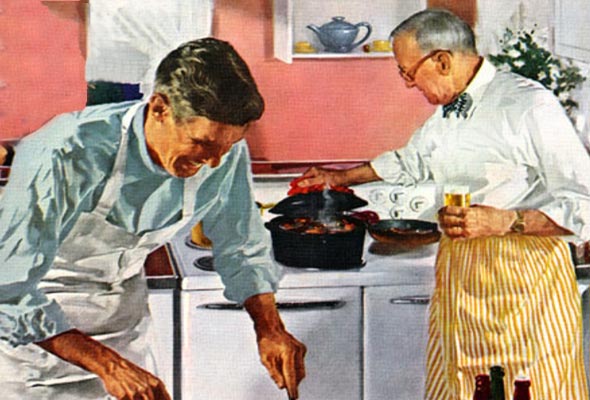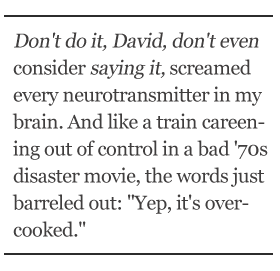

I lost my virginity to Ron Leal. It happened recently, in the waning weeks of my fourth decade. The One was there, watching every move, every nuance on my face, as were four others, including Joseph Montebello, Ron’s partner. It wasn’t weird or freaky. In fact, it was one of the sweetest moments in memory: It was the first time someone—a virtual stranger, no less—cooked my food and served it to me and others at a dinner party.
Well, that’s not exactly true. There have been a few times that chefs have cooked from my book—most notably at the Quail Valley Country Club, in Vero Beach, FL. Chef Joe Faria whipped up a three-course dinner from The New Portuguese Table for 70 people. And it was exceptional, extraordinary. But the thing is: I expected it to be exceptional and extraordinary. He’s a chef, after all. But Ron is an ordinary guy of Portuguese descent whom I’ve met just once before, and he had the cojones to invited us over for an intimate evening of food, fun, gossip—all based upon my book.
From what I’ve been told, this is, without a doubt, an experience a cookbook author assiduously wants to avoid. Think about it: What if the cook can’t cook? What if there isn’t a dog I can surreptitiously feed my food to—or there is, but I do so too quickly and unwittingly encourage a heaping pile of seconds? What if the food just plain sucks? I’m no good at lying—blame it on Momma and Poppa Leite. In fact, I’m pathologically predisposed to creating astoundingly awkward moments as I tell you you’re falling out of your dress, you’re marrying the wrong woman, or you have a booger hanging from your nose—all of which I’ve done. (Note to self: Maybe that’s why we have so few friends.) No, this is a situation best avoided.
Still, like a gleek to “Glee,” I was drawn to that dinner in Litchfield, CT. On the way, The One and I practiced ways of my squirming out of insults without outright lying. Instead of: “Ron, you ruined the port-prune sauce by oversalting it,” I could say, “My, Ron, you have a bold hand when it comes to seasoning.” Or, “Such a creative interpretive spin you put on the dessert,” as opposed to “God, Ron, you really mucked this up, didn’t you? Did you even read the recipe?” See: a silk purse out of a sow’s ear, and he’s none the wiser.

The evening was going well. We were introduced to the other guests, one of whom was Todd Johnson, author of the novel The Sweet By and By. Then it happened. The moment that had “David, keep your mouth shut!” written all over it:
“I think I overcooked your red pepper jam,” said Ron, as he handed me a cracker smeared with cheese and dotted with his version of my jam. The subtext and body language clearly were, But tell me I didn’t, please, oh great and powerful Portuguese cookbook author. A small nibble was followed by a few clacks of my tongue to get some air moving in my mouth. Don’t do it, David, don’t even consider saying it, screamed every neurotransmitter in my brain. And like a train careening out of control in a bad ’70s disaster movie, the words just barreled out: “Yep, it’s overcooked.”
One, two, three. I looked at The One. His expression: Why? Three, four, five. I looked at Ron. He just shrugged and said, “Well, then, eat the wasabi peas.” Perfect! Mock hurt tinged with a bit of playful passive-aggression and just the right touch of snark. I was now on familiar territory.
Joseph corralled everyone into the dining room, more of a cozy library, really, with a superbly set table in the middle. As we pulled out our chairs, lying on each seat was a book. In what is perhaps the most touching and elegant gesture I’ve experienced in my writing career, Joseph and Ron gave me and The One a copy of Todd’s novel; Todd and his partner, Michael, a copy of my cookbook; and another guest a copy of both. Hot dammit! Why did I have to say the jam was overcooked?
We scraped our chairs under the table, unfolded our napkins in our laps, and waited for Ron to serve the first course: chilled fava bean soup with apple and sauteed shallots. All eyes were on me. I was now judge, jury, and guest of honor. But so resolute was I that I made a decision to heap nothing but praise upon Ron for the rest of evening.
It wasn’t an effort. Never once did I have to twist my comments, lawyer-like, to avoid saying something critical or affect a constipated smile, as when a fragile, emotional junior-high student with great hair had to watch carrot-topped Tim Hazel win every freaking scholastic award year after year. (Not that I would know anything about that.) Everything was spot on. The soup worked perfectly, even if he had to use lima beans in place of the favas—a sanctioned substitution. Seared skate in a saffron broth followed, which Ron kept apologizing for saying it was overcooked (there’s that word again), but which I was grateful to have. And dessert was his favorite growing up in a Portuguese home: rice pudding, but spooned between puffs of pastry triangles, a twist I learned while in Portugal.
I’m sure that as I stagger ungracefully into my fifties, I’ll receive other invitations from people to dine with them as they cook from my book. And I’m sure I’ll accept, but it’ll never be the same as with Ron. After all, you never forget your first time. This essay has been updated. Originally published June 7, 2010.












David,
After a long silence between our time together at Greystone and now, just a quick, long-overdue mash note here to say Magnifico! in general (your books, your career, your website, your so-deserved accolades), and the virtual and real happiness you generate through all those things. And re your weekly e-letter: What a delight it is to receive and savor literally and visually (your olive cookies, btw, have become a monthly staple in this house) , particularly in the vast sea of daily delete mail. Intelligence, wit, curiosity, erudition, skill, knowledge….well, we could go on but you and your readers already know all that.
As for your elegant evening with Ron and Joseph: their aplomb is not surprising considering the fact that they have two Westies. As the owner of one (my third) of these supremely confident, super dogs myelf, I can say that living with the breed sharpens up ones wits considerably. Actually, you share, in spades, a Westie attribute: You always know where you stand with them. A lot of people find that a direct connection to real friendship, both canine and human.
A wonderful piece, as always–
Suzanne
Suzanne, how wonderful to hear from you! Thanks for your mash note—know that it goes both way. (Do you know I still make the Roasted Red Tomato Sauce from your 1998 New York Times article? I love it.
And thank you again for that scholarship, all those year ago, to the Greystone Food Writers Conference. It was a magical time.
Wow–great piece!!! And small world: Joseph is a former colleague of mine—I’ve known him for years. A brilliant art director.
Thanks, Elissa!
I have never thought about this particular situation from the perspective of the expert/cookbook author. As the owner of a baking business, I am usually met with the opposite experience. Nobody but nobody wants to offer me a dessert, whether it be a homemade cookie or a store-bought cake. Neighbors are stumped at the holidays, as they fear that their usual swap of crude gingerbread men and hastily decorated sugar cookie cutouts would fall short in my eyes. My sweet tooth, however, knows no prejudice, and it turns out there are very few treats of which I won’t take at least a taste!
Casey, Ron is one of the few, the proud, the brave. Usually no one wants to cook for me. But like you, I have little prejudice. I don’t judge when I sit at someone’s table. I’m happy for the invitation. (These invites tend to be from the friends I haven’t told that they’re falling out of their dresses or marrying the wrong people!) Like my friend Matty Roselli, a great cook, says:” Even a burger and a soda is fine with me.” I guess I’m an EOE—an equal opportunity eater.